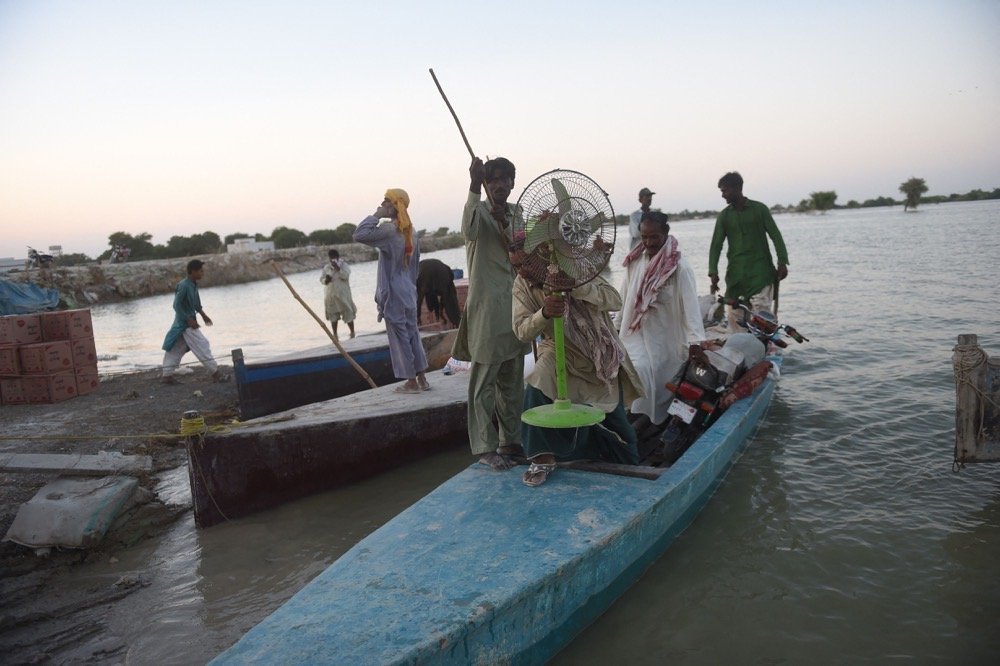KARACHI: Pakistan is bracing for a harsh winter this year amid skyrocketing prices of liquefied natural gas on the global market and record currency depreciation at home.
Analysts are warning of increasing gas outages during peak winter hours as the south Asian country struggles to meet domestic demand.
Pakistan needs 4.1 billion cubic feet per day (bcfd) of gas, with winter demand peaking to around 4.5 bcfd against local production of 3.22 bcfd. The shortfall is bridged through LNG imports.
Pakistan began importing LNG seven years ago. However, the price of the commodity on the international spot, or short-term, market has risen from lows of $2 per million British thermal units (mmBtu) in 2020 to highs of $57 in August this year after demand in Europe surged, pushing Islamabad out of the market.
At present, the country relies on imported LNG cargoes through long-term contracts with Qatar and Italian multinational ENI. The agreements allow the country to import about eight cargoes per month, four short of the required 12 to meet the shortfall.
An official from Pakistan LNG Limited, a state-owned entity mandated to import LNG, told Arab News on Tuesday that the country is currently importing long-term cargoes from Qatar and ENI.
With the spot LNG market out of reach, many Pakistani analysts predict shortages will make the coming winter tough for domestic gas consumers.
Pakistan imported its last LNG cargo from Qatar at $17 per mmBtu under a long-term supply agreement.
“Normally the demand in winter increases by around 1 bcfd,” Farhan Mahmood, head of research at Sherman Securities, told Arab News. “As this year Pakistan is unlikely to secure cargoes from the spot market, it is expected that shortfall and load shedding of gas will be higher than last year.”
He added: “With LNG prices currently hovering around $38 per mmBtu and the Pakistani rupee trading at historic lows amid depleting forex reserves, the government may not venture to import costly gas, rather it would prefer to save dollars.”
PLL did not receive any bid in response to a tender floated in July 2022 to import 10 cargoes of LNG.
Pakistan’s woes were compounded after Russia invaded Ukraine early this year, and European countries rushed to secure gas supplies from LNG-producing countries as Moscow slowed gas flows westwards.
The Kremlin has accused the West of triggering the energy crisis by imposing the most severe sanctions in modern history, a step Russian President Vladimir Putin said is akin to a declaration of economic war.
“The Russia-Ukraine war has also disrupted the international market and European countries have rushed to secure cargoes for winter as demand has increased substantially there,” Mahmood added.
However, some experts believe gas outages will be comparatively low this winter, with additional electricity generation compensating for the high demand.
“By December this year, some 1320MW of electricity will be added to the national grid with the commissioning of three coal-fired power plants in Thar, Sindh, that will compensate the gas demand,” Tahir Abbas, head of research at Arif Habib Limited, a Karachi-based brokerage firm, told Arab News.
“There will definitely be a shortfall of gas, but it will not be as severe as last year, keeping in view the additional electricity generation.”
Pakistan’s winter policy of diverting gas supplies from the power sector to domestic consumers also affects industrial production.
This year, the government is expected to encourage consumers to switch to electricity by offering incentives to save gas for industrial and heating purposes.
In another bid to secure long-term supplies of gas, PLL has invited bids for 72 LNG cargoes from international suppliers across a six-year period. The results of the tender will be decided on Oct. 3 when the bids are opened.
Pakistan’s LNG imports fell by 3.37 percent to $629.4 million during July and August compared with the same period last year.
Energy imports increased by 105.3 percent to $23.3 billion during the last fiscal year, including LNG imports, which rose by 90.6 percent to $4.98 billion, according to official data.




